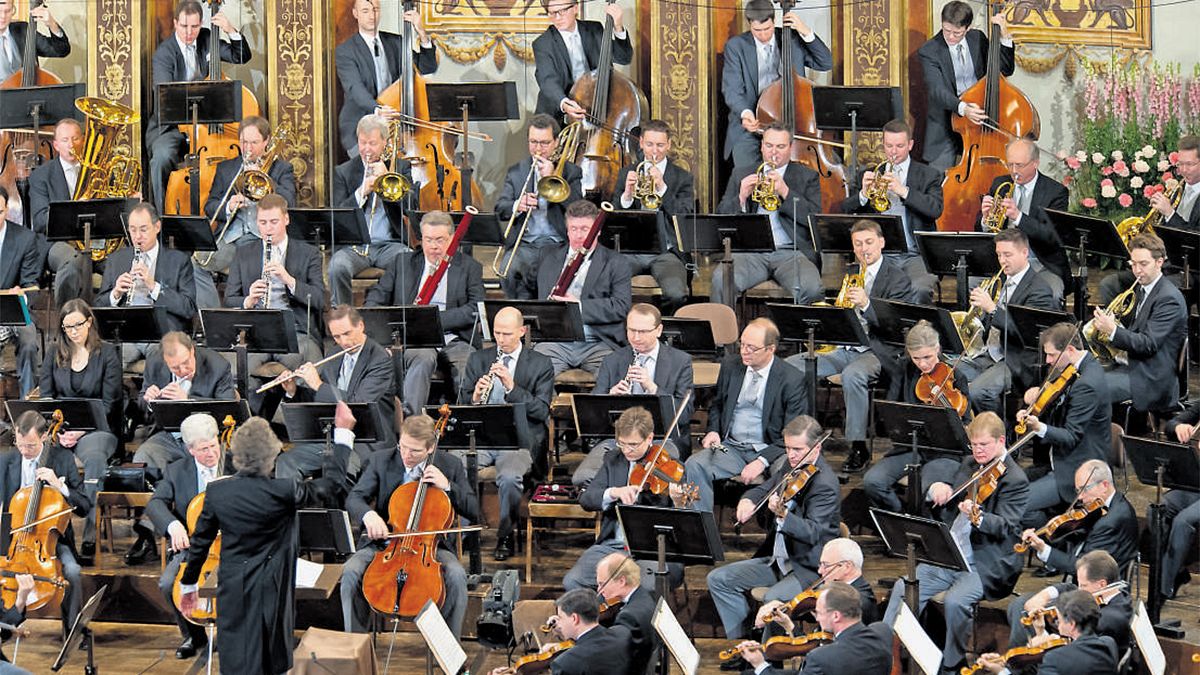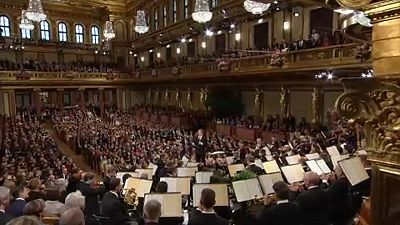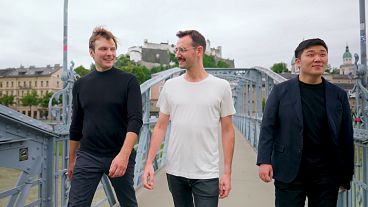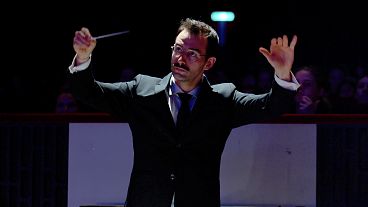Article brought to you by
PHILOSOPHY AND TRADITION
AN ORCHESTRA UNLIKE ANY OTHER
The Vienna Philharmonic Orchestra is a name instantly recognizable in the wider world, in large part thanks to its celebrated New Year concerts, which are broadcast live in more than 80 countries every year, but also because of the consistently high quality of its music-making, both in Vienna and abroad.
The Vienna Philharmonic’s structure and ways of working have endured for 171 years, ever since musicians from the Court Opera, as the State Opera was called then, decided to present a series of concerts independently. It is a unique institution, entirely self-governing and independent, and the orchestra’s president and general manager are elected by members of the orchestra.

Clemens Hellsberg, first violinist and president of the Vienna Philharmonic Orchestra.
© Terry Linke
Clemens Hellsberg, first violinist and president, says: ‘‘Playing in the Golden Hall as a member of the Vienna Philharmonic orchestra makes one aware that our predecessors played under the baton of Richard Wagner, that they played in front of Johannes Brahms, sitting next to Antonin Dvorak; that Gustav Mahler conducted the orchestra; that Richard Strauss conducted many, many concerts.’’
The musicians perform double duties as the orchestra for the Vienna State Opera, with whom they give some 300 performances a year, and working with a series of guest conductors rather than (as is the case in most orchestras) with a chief conductor.

Dieter Flury, first flutist, is the general manager and artistic director of the Vienna Philharmonic.
© Terry Linke
‘‘Daily work in the opera is artistically very important for the orchestra,’’ says Dieter Flury, first flutist and the orchestra’s general manager and artistic director. ‘‘The singing voice forms us.’’ It gives the players a unique opportunity to phrase their playing in tandem with the human voice, almost breathing together, he explains. After three years in the orchestra, each player becomes an active member of the association, with the right both to elect members of the association and to be elected as an officer.
There is a strict process for joining the Vienna Philharmonic. Each player has to overcome three hurdles: First, players must be invited for an audition. Second, they need to be successful in the audition, which, in order to ensure absolute impartiality, takes place behind a curtain. Third, after a probationary period of up to two years, a jury made up of members of the orchestra discusses whether it is appropriate for that player to continue as a member.
Flury points out that ‘‘for those very few cases where a member does not keep up the level, a social solution has to be found. Without a chief conductor, it has to be part of the democratic process.’’ The responsibility of making a full contribution to the orchestra’s sound, listening to the other players and the sense of privilege of belonging to such a celebrated institution help the players to maintain the highest standards, he says.
One of Flury’s tasks as artistic director is to negotiate with conductors and concert promoters on the choice of program for each concert. Conductors initially express their preferences, and choices are made depending on other pieces played in the season or in recent seasons.

The Vienna Philharmonic Orchestra at the New Year’s concert of 2013, conducted by Franz Welser-Möst.
© Richard Schuster
Orchestra members also make suggestions and, true to the democratic spirit of the orchestra, often those proposals come to fruition in concerts. It is perhaps inevitable that concert promoters prefer the established classics, and there is no shortage of works from which to choose in the great 19th-century Viennese repertoire. The Vienna Philharmonic, however, is eager to continue its promotion of new music. With a history of nearly 300 premiered works by the Vienna Philharmonic, explains Flury, there is a strong desire to continue this tradition.
‘‘We are privileged that even with so-called difficult programs,’’ he says, ‘‘we manage to fill halls. We are very proud that in Carnegie Hall in 2010, for instance, we had three sold-out evenings with works by Schoenberg, Webern and Boulez, and only two symphonies by Beethoven.’’ Among future projects, the Vienna Philharmonic will be performing the premiere of a new work by the Austrian composer Olga Neuwirth in May 2015.
CONDUCTORS & COMPOSERS
LEGENDARY MUSICAL PARTNERS
For the first 100 years of its existence, members of the Vienna Philharmonic Orchestra elected a ‘‘subscription conductor’’ to lead every concert in a single season. Such names as Hans Richter (who conducted the first performances of Richard Wagner’s ‘‘Ring’’ cycle), Gustav Mahler, Wilhelm Furtwängler and Clemens Krauss (who was the librettist for Richard Strauss’s final opera, ‘‘Capriccio’’) held this position. In 1933, the system of inviting celebrated guest conductors was put in place, a practice that persists to this day.
Although the Vienna Philharmonic does not have a chief conductor, it maintains close links with some 20 of these guest conductors, who return to perform with the orchestra at regular intervals.
Dieter Flury, the orchestra’s general manager and artistic director, likens the conductors to members of a family spanning generations.
Some, like Zubin Mehta, Lorin Maazel and Georges Prêtre, have been coming back for more than 50 years. Others, such as Riccardo Muti, Daniel Barenboim, Simon Rattle, Riccardo Chailly, Franz Welser-Möst and Daniele Gatti, have well-established links with the orchestra. Among the long list of renowned conductors working with the Vienna Philharmonic are Nikolaus Harnoncourt, Mariss Jansons, Pierre Boulez, Esa-Pekka Salonen, Valery Gergiev, Semyon Bychkov and Christian Thielemann.
Young conductors are also essential to the orchestra’s future. During the 2014 season, for example, the Latvian Andris Nelsons, the Swiss Philippe Jordan, the Canadian Yannick Nézet-Séguin and the Venezuelan Gustavo Dudamel, who are all under the age of 40, will be conducting the Vienna Philharmonic. As Flury puts it: ‘‘Hopefully our young conductors will have the chance to celebrate their 50 years with the orchestra in the future!’’
The world’s great conductors have worked with the Vienna Philharmonic throughout its illustrious history. One early guest conductor, Hans Knappertsbusch, settled in Vienna in the 1930s after having been dismissed from his position as head of the Bavarian State Opera on the orders of Hitler. He made a number of important recordings with the Vienna Philharmonic.
Another great recording pioneer with the orchestra was Georg Solti, who between 1958 and 1964 made the first stereo recording of Wagner’s ‘‘Ring’’ cycle, which continues to be the most successful opera recording of all time and features glorious singers like Birgit Nilsson as Brünnhilde and Régine Crespin as Sieglinde, led by the ferocious energy of Solti’s conducting. Never has the opening music to ‘‘Die Walküre’’ sounded so visceral and driven.

Herbert von Karajan.
© Wiener Philharmoniker Historisches Archiv
Speaking of his early years with the orchestra, Flury remembers the guest conductorships of Herbert von Karajan, Carlos Kleiber and Leonard Bernstein, who made a deep impression on him as he was starting his career.
When asked about Karajan’s tendency to close his eyes while conducting, Flury offers an insight into the maestro’s craft: ‘‘He didn’t keep his eyes closed all the time; sometimes he watched his own hands while conducting, and as a result the whole orchestra would keep their eyes on his hands, too. When he closed his eyes, he was in an inner world, but the orchestra never felt lost; they shared his vision.’’
Throughout its history, the Vienna Philharmonic has premiered works by composers who have also conducted the orchestra. The list is impressive, including Otto Nicolai (the founder of the Vienna Philharmonic), Johannes Brahms, Max Bruch, Anton Bruckner, Antonin Dvorak, Gustav Mahler, Richard Strauss and, in more recent times, André Previn and Lorin Maazel.
It should come as no surprise that the author of the famous ‘‘Blue Danube’’ waltz, Johann Strauss II, also conducted the Vienna Philharmonic in his own work, including his ‘‘Wiener Blut’’ waltz.
Other composers who have not conducted the orchestra but whose work has been premiered by it include Pyotr Tchaikovsky, Krzysztof Penderecki, Hans Werner Henze, Aribert Reimann and Olga Neuwirth.
Richard Strauss, who was born in Munich 150 years ago, had an intensely creative relationship with the Vienna Philharmonic and the State Opera. While he was director of the State Opera between 1919 and 1924, the opera premiered his masterpieces ‘‘Ariadne auf Naxos’’ (1916) and ‘‘Die Frau ohne Schatten’’ (1919), and performed many of his other operas while he was there. The house that he built and lived in is still in existence in Vienna’s third district.
Another of the famous directors of the Vienna Court Opera, as it was called before the establishment of the First Austrian Republic, was Gustav Mahler, who between 1897 and 1907 presided over what has been called the opera’s most glorious decade.
WALTER BARYLLI
A VETERAN MUSICIAN LOOKS BACK
No living person encapsulates the great history of the Vienna Philharmonic Orchestra as completely as 92-year-old Walter Barylli. Joining the orchestra in 1938 and becoming concertmaster in 1939 as a young man, Barylli’s first years in the orchestra were marked by the terrors of World War II. Indeed, he was concertmaster at the very first New Year’s concert in 1939.
As he continued his career as first violinist in the postwar years, he played under a succession of the greatest conductors of the 20th century. Barylli has vivid memories of Wilhelm Furtwängler, Bruno Walter, Herbert von Karajan and Leonard Bernstein (who, according to Barylli, spoke excellent German and was a great communicator). Barylli remembers with particular fondness Clemens Krauss, whom he calls one of the best New Year’s concert conductors. ‘‘I was a very young man,’’ he says, ‘‘and I remember playing the Tchaikovsky Violin Concerto with him in Dresden. It was an unforgettable experience.’’

Walter Barylli, former VPO concertmaster.
© Terry Linke
Another concert he recalls is one of the first concerts played abroad by the orchestra after the war, with Bruno Walter conducting, in Edinburgh in September 1947.
When asked if the sound of the orchestra has changed over the 75 years that he has been associated with the Vienna Philharmonic, Barylli is adamant that the same distinctive sound has been maintained throughout the years. ‘‘After all,’’ he says, ‘‘the instrumentalists have all been taught by Viennese teachers, who pass on the Viennese sound to their pupils.’’
Far from looking back through rosetinted glasses, he stresses that the sound of today’s orchestra is, if anything, better than it was 40 or 50 years ago.
Barylli is also renowned for the quartet that he founded and that was based at the Vienna Musikverein during the 1950s. The Barylli Quartet made numerous recordings of the great German and Austrian chamber music repertoire. Barylli also taught at the Vienna conservatory between 1969 and 1986.
He continues very regularly to attend concerts by the Vienna Philharmonic. In early December, he heard the orchestra’s young concertmaster, Volkhard Steude, play the Mendelssohn Violin Concerto under the baton of Andris Nelsons, and he relished being able to speak to the soloist and orchestra members. Asked whether the younger players appreciated being able to speak to someone with such long experience, Barylli is touchingly modest: ‘‘They have no need for me — they find inspiration and certainty within the Viennese tradition.’’
NEW YEAR’S CONCERT
DANIEL BARENBOIM RINGS IN 2014
Talking to Daniel Barenboim, conductor of the 2014 New Year’s concert with the Vienna Philharmonic Orchestra, it is hard not to be swept along by the enthusiasm he brings to all his projects.
At one moment, he recalls with pleasure the rapturously received concert performances of the epic Wagner ‘‘Ring’’ cycle at the 2013 London Proms (held over the course of a week), where he instructed his orchestra to ‘‘tell the whole story through the music.’’
At another moment, he speaks with equal excitement about the short pieces that make up the forthcoming New Year’s program in the Musikverein in Vienna. The concert will mark 25 years of Barenboim’s association with the Vienna Philharmonic as a conductor, and, as he points out, considerably more years as a piano soloist. Clearly the occasion will be a celebratory affair.

The 2014 New Year’s concert marks 25 years of Daniel Barenboim’s association with the VPO.
© Monika Rittershaus
Asked about the particular qualities of such a long-established orchestra, Barenboim praises the players for their desire to make significant individual contributions while at the same time achieving the remarkable homogeneous sound for which the Vienna Philharmonic is renowned.
Barenboim first conducted the orchestra’s New Year’s concert in 2009, and he exclaims: ‘‘I was stunned at the degree of curiosity that the players brought to such familiar music. They were so alive and interested, engaged in a voyage of discovery, and yet with so much knowledge.’’
As for the waltz music of the Strauss family, Barenboim emphasizes that it forms part of a long tradition of 19th-century music. ‘‘We should not forget that one of them,’’ he says, referring to Johann Strauss II, ‘‘was a lifelong friend of Brahms.’’ Far from being easy to conduct, the Strauss waltzes need particular treatment, the maestro insists, with a variety of articulation and phrasing in order to attain the famous Viennese lilt.
Discussing the planning of the program for the concert, he says that it was much more difficult to construct a series of small pieces than it would have been to place a single Bruckner symphony on the program. He acknowledges that there is a danger of having simply a concert of encores, and for this reason he was eager to find connections between the pieces and to make units of works within the program.
Of the most familiar Viennese waltz, he says: ‘‘When you hear the ‘Blue Danube’ being played on a plane or in an elevator, you hear it without really listening, but having it in a concert forces the public to listen.’’ Barenboim calls the piece ‘‘a masterpiece.’’
‘‘The secret of the ‘Blue Danube,’’’ he says, ‘‘is in its magical introduction. There is a sense of expectation that is bewildering.’’
Barenboim is adhering to a long tradition of not revealing the exact lineup of the concert program until just before the event, but he does reveal that the program will contain a piece by another Viennese composer with the surname Strauss, the great operatic composer Richard Strauss, who is unrelated to the Johann Strauss family. What better way to mark 2014, the 150th anniversary of his birth, than in the company of his illustrious namesakes?
CARNEGIE HALL SERIES
A TIME OF CULTURAL FLORESCENCE
The Vienna Philharmonic Orchestra enjoys taking up residency at New York’s Carnegie Hall each spring, usually performing three concerts on Friday and Saturday evenings and Sunday afternoon. In 2014, however, a whole series of events (from Feb. 24 to March 16) will be devoted to Vienna, commemorating 100 years since the beginning of World War I and 200 years since the Vienna Congress, at which the European continent’s map was redrawn in the aftermath of the French Revolutionary Wars, the Napoleonic Wars and the dissolution of the Holy Roman Empire.
The principal aim of the week will be to commemorate the transition from the 19th to 20th centuries in Vienna, with the Vienna Philharmonic, the Vienna State Opera and Carnegie Hall combining forces for a series of concerts, lectures, exhibitions and symposia on an extraordinary time not only for music but also for other arts and sciences.
No fewer than four great conductors — Franz Welser-Möst, Daniele Gatti, Andris Nelsons and the veteran Zubin Mehta, who has been associated with the Vienna Philharmonic for over 50 years — will direct a dazzling array of concerts of Viennese music, ranging from concert performances of Richard Strauss’s opera ‘‘Salomé’’ and Alban Berg’s masterpiece ‘‘Wozzeck’’ to concerts of works by some of the great 19th- and 20th-century composers, such as Ludwig von Beethoven, Franz Schubert, Anton Bruckner, Gustav Mahler, Arnold Schoenberg and Anton Webern.
On March 16, Mehta will conduct a final gala concert with works by other so-called ‘‘minor’’ composers from Vienna, like Hugo Wolf, Erich Korngold, Franz Schmidt and Theodor Berger, not to forget the Johann Strauss family. As the Vienna Philharmonic’s principal flutist and artistic director, Dieter Flury, puts it: ‘‘Without the base of a pyramid, there is no peak, so the base will also be presented in this and other concerts.’’
Korngold — a child prodigy while growing up in Austria and composer of two extraordinary operas, ‘‘Die Tote Stadt’’ and ‘‘Das Wunder der Heliane’’—had an American career. He moved to Hollywood in 1934 and became a composer for Hollywood movies, particularly those in which Errol Flynn starred, such as ‘‘The Adventures of Robin Hood’’ (1938) and ‘‘The Private Lives of Elizabeth and Essex’’ (1939). His Violin Concerto in D major, which will be performed by the soloist Gil Shaham at the gala concert, was written in 1945 while he was living in the United States.
SALZBURG FESTIVAL
IN SUMMER, A HOME AWAY FROM HOME
Since 1933, the Vienna Philharmonic has taken up residency at the Salzburg Festival in July and August. As Dieter Flury, the orchestra’s general manager, explains: ‘‘Most orchestra members take their families with them, and it is a summer holiday for families and something between holiday and work for the members.’’

Philippe Jordan will conduct the Vienna Philharmonic at the Salzburg Festival in August.
© Terry Linke
The 2014 festival program looks fascinatingly diverse. On the concert platform, the symphonic output of the great Austrian composer Anton Bruckner will be explored by the conductors Daniel Barenboim, Riccardo Chailly, Daniele Gatti, Riccardo Muti and Philippe Jordan.
One concert in particular, on Aug. 17, conducted by Muti, who has been associated with the Vienna Philharmonic for 40 years, commemorates the 25th anniversary of the death of another conductor closely associated with the orchestra, Herbert von Karajan. The program will consist of Franz Schubert’s Symphony No. 4 (the ‘‘Tragic’’) and Bruckner’s Symphony No. 6, both works that Karajan performed frequently and recorded.
The operatic program will contain fans’ favorites, like Mozart’s ‘‘Don Giovanni,’’ conducted by Christoph Eschenbach with Ildebrando D’Arcangelo in the title role; Richard Strauss’s ‘‘Der Rosenkavalier,’’ with Franz Welser-Möst at the podium; and Verdi’s ‘‘Il Trovatore,’’ with Daniele Gatti conducting. Plácido Domingo makes a welcome return to the Verdi opera, not in his more accustomed tenor role of Manrico but, in keeping with his performance of more baritone roles in the last few years, in the part of the Count di Luna.
There will also be some more unusual offerings. Schubert’s less commonly performed opera ‘‘Fierrabras’’ comes under the baton of Ingo Metzmacher. Flury recalls with pleasure a production of the opera with Claudio Abbado in 1988, but it has always been a rarity, possibly because of the perception that its libretto, by Joseph Kupelwieser, is weak. Nevertheless, Flury argues that ‘‘Schubert shares the destiny of Joseph Haydn. Both wrote wonderful operas, but they are constantly forgotten as opera composers. We are very happy to have the opportunity to perform this work by Schubert, which is not performed often enough.’’

MARKING THE VIOLENT BIRTH OF THE 20TH CENTURY
Few single events have shaped history in as catastrophic a way as the two gunshots that were fired in the city of Sarajevo on June 28, 1914. The assassination of Archduke Franz Ferdinand of Austria, the presumptive heir to the Austro-Hungarian Empire, and his wife Sophie led directly to the declaration of war by Austria-Hungary on Serbia, which in turn unleashed the horrors of the First World War. Next June 28, 100 years later, the Vienna Philharmonic, under the baton of Franz Welser-Möst, will be performing in Sarajevo a program carefully devised to reflect the ways in which the old world met a newer, harsher one. The concert will include Haydn’s ‘‘Kaiser’’ quartet, reflecting the Danube monarchy, and Schubert’s Unfinished Symphony, described by Dieter Flury, the orchestra’s artistic director, as ‘‘music to paint the Austrian soul, which is sometimes so close to the grave.’’ Brahms’s choral work ‘‘Schicksalslied’’ (Song of Destiny) — set to a work by the German Romantic poet Friedrich Hölderlin in which the ancient Greek concept of the tragic fall is evoked —will reflect the gravity of the occasion. Finally, Ravel’s ‘‘La Valse’’ will recall the Viennese tradition of the waltz, seen through the lens of the 20th century.

Text by NICK HAMMOND



